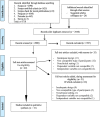Humor interventions in psychotherapy and their effect on levels of depression and anxiety in adult clients, a systematic review
- PMID: 36683998
- PMCID: PMC9845902
- DOI: 10.3389/fpsyt.2022.1049476
Humor interventions in psychotherapy and their effect on levels of depression and anxiety in adult clients, a systematic review
Abstract
Introduction: Humor as a valuable construct in psychology has been the subject of much discussion for many years and has received increased attention more recently in the field of positive psychology. However, empirical research on the application of humor in a clinical setting with depressed or anxious clients has been difficult to discover. Because of the potential benefits and the low costs of providing humorous interventions, our goal was to give an overview of the studies conducted in psychotherapy and to show the effect of humor on the levels of depression and anxiety symptoms. Furthermore, we wanted to assess the empiric support of humor as a clinical intervention in psychotherapy according to the SIGN system.
Methods: We used the PRISMA guidelines. Because of the differences in the design of the 10 included studies, it was not possible to perform a meta-analysis.
Results: Results from studies performed in seven different countries show that humorous interventions can have significant positive effects on symptoms of depression and anxiety. The results also confirm the prior observation that empirical research in the field is based on different designs with different populations and different methods of translating the abstract concept of humor into measurable observations. The results need to be considered with caution because of the methodological limitations of the research to date.
Discussion: Some authors advocate for an integrative approach to continue research on humor in psychotherapy. It is our recommendation to first focus on the separate aspects of humor and to conduct research based on sound methodology. To initiate wider research to the application of humor in psychotherapy, we propose an approach to humorous interventions based on surprise and confusion which can help clients to search for an alternative framework to resolve the confusion and therefore promote taking on new perspectives and distancing themselves from the actual problem.
Keywords: alternative framework; anxiety; confusion; depression; humor; positive psychology; psychotherapy.
Copyright © 2023 Sarink and García-Montes.
Conflict of interest statement
The authors declare that the research was conducted in the absence of any commercial or financial relationships that could be construed as a potential conflict of interest.
Figures
Similar articles
-
The future of Cochrane Neonatal.Early Hum Dev. 2020 Nov;150:105191. doi: 10.1016/j.earlhumdev.2020.105191. Epub 2020 Sep 12. Early Hum Dev. 2020. PMID: 33036834
-
Humor Associated With Positive Outcomes in Individual Psychotherapy.Am J Psychother. 2018 Nov 1;71(3):95-103. doi: 10.1176/appi.psychotherapy.20180021. Epub 2018 Sep 12. Am J Psychother. 2018. PMID: 30205695
-
Psychological interventions to improve self-management of type 1 and type 2 diabetes: a systematic review.Health Technol Assess. 2020 Jun;24(28):1-232. doi: 10.3310/hta24280. Health Technol Assess. 2020. PMID: 32568666 Free PMC article.
-
Can the use of humor in psychotherapy be taught?Acad Psychiatry. 2014 Feb;38(1):75-81. doi: 10.1007/s40596-013-0018-2. Acad Psychiatry. 2014. PMID: 24430586 Review.
-
[The Use of Humor in Psychotherapy: a View].Sante Ment Que. 2017 Spring;42(1):425-443. Sante Ment Que. 2017. PMID: 28792581 French.
Cited by
-
Efficacy of Comedy on Health-Related Quality of Life and Oxidative Stress in Cancer Survivors.Cureus. 2023 Jul 31;15(7):e42760. doi: 10.7759/cureus.42760. eCollection 2023 Jul. Cureus. 2023. PMID: 37654944 Free PMC article.
-
Understanding How and When Therapists Misstep: Navigating Engagement Challenges in Youth Mental Health Services.Res Child Adolesc Psychopathol. 2025 May;53(5):669-685. doi: 10.1007/s10802-025-01297-y. Epub 2025 Mar 11. Res Child Adolesc Psychopathol. 2025. PMID: 40067531 Free PMC article. Clinical Trial.
-
Humor in professional coaching: a literature review and research agenda.Front Psychol. 2024 Jul 4;15:1288104. doi: 10.3389/fpsyg.2024.1288104. eCollection 2024. Front Psychol. 2024. PMID: 39027054 Free PMC article. Review.
References
-
- Martin RA. The Psychology of Humor. London: Elsevier Academic Press; (2007). 10.1016/B978-012372564-6/50024-1 - DOI
-
- Gremigni P. Is humor the best medicine? In: Gremigni P. editor. Humor and Health Promotion. Waltham, MA: Nova Biomedical Books; (2012). p. 299.
-
- Wellenzohn S, Proyer RT, Ruch W. Humor-based online positive psychology interventions: a randomized placebo-controlled long-term trial. J Posit Psychol. (2016) 11:584–94. 10.1080/17439760.2015.1137624 - DOI
Publication types
LinkOut - more resources
Full Text Sources


